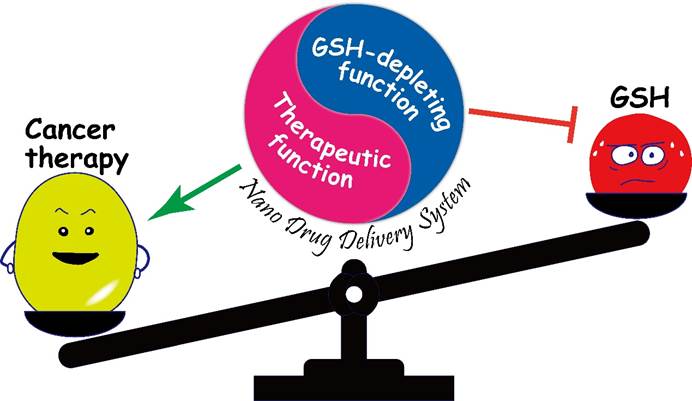(Correspondent Yuxuan Xiong) On 2021 March 26th, Prof. Zifu Li and Prof. Xiangliang Yang from College of Life Science & Technology and National Engineering Research Center for Nanomedicine published a review article titled "Engineering nanomedicine for glutathione depletion-augmented cancer therapy" in Chemical Society Reviews (IF=42.846), an internationally renowned journal of the Royal Society of Chemistry.
Glutathione (GSH) is a natural tripeptide widely found in animal and plant cells. It plays a vital role in regulating the redox balance in the cell. Past studies have shown that GSH is closely related to the initiation, progression and metastasis of cancer. In addition, the high concentration of GSH in tumor cells will hinder multifarious treatment modalities. Biological/chemical depletion of GSH in cancer cells is considered to be a feasible strategy to improve the efficiency of cancer treatment. However, it is difficult to achieve simultaneous delivery of free therapeutic agent/GSH depleting agent, and the targeted delivery efficiency is low. The rise of nanomedicine has brought dawn to this problem. In recent years, due to the tumor targeting and versatility of nanomedicine, the design of nanomedicine that can simultaneously deliver GSH depleting agent and therapeutic agent has attracted wide attention from researchers.

Figure 1. Leveraging nanomedicine for GSH depletion and cancer therapy
Based on the related work of the team and domestic and foreign researchers, in this review, we first summarized different strategies for depleting tumor cells GSH from the biological and chemical perspectives, and then focused on typical studies of sensitizing various therapies through GSH depletion (Including traditional chemotherapy, radiotherapy, and emerging kinetic therapies, immunotherapy, iron apoptosis-mediated cancer treatment, etc.) (Figure 1). At the same time, the potential mechanism of GSH consumption in enhancing the anti-tumor efficacy of nanotherapeutics is clarified. In addition, this article also analyzes and prospects the challenges and opportunities faced by this nano-drug-based combination therapy strategy in clinical transformation.
Ph.D. candidates Yuxuan Xiong, Chen Xiao from College of Life Science & Technology are co-first authors of this review paper. Prof. Zifu Li from College of Life Science & Technology is the corresponding author. This review paper is supported by grants from the National Key Research and Development Program of China, National Science Foundation of China and the Program for HUST Academic Frontier Youth Team (Mechano-nanooncology).
The paper link: https://doi.org/10.1039/D0CS00718H